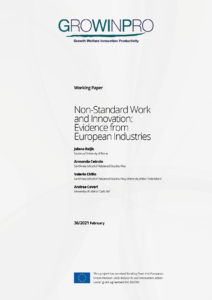Following a market-oriented approach, policies aimed at increasing labour flexibility by weakening employment protection institutions should enable firms to efficiently allocate resources, improve their capability to compete on international markets and adjust to economic cycle. This work documents the rise of non-standard (i.e. temporary and part-time) work in five European countries (Germany, France, Italy, the Netherlands and the United Kingdom) over the period 1994-2016 and investigate the nexus between the use of non-standard work and innovation performance using data for 18 manufacturing and 23 service industries. Contrary to the objectives that market-oriented policy recommendations promised to achieve, we show that there is a significantly negative association between the share of workers employed under non- standard contractual arrangements and the introduction of both product and process innovation. Furthermore, we show that the harmful consequences of the spread of non-standard work on firms’ product innovation propensity are more pronounced in high-tech sectors.
 Non-Standard Work and Innovation: Evidence from European Industries
Non-Standard Work and Innovation: Evidence from European Industries
Jelena Reljic
Armanda Cetrulo
Valeria Cirillo
Andrea Coveri
working paper 2/2021
